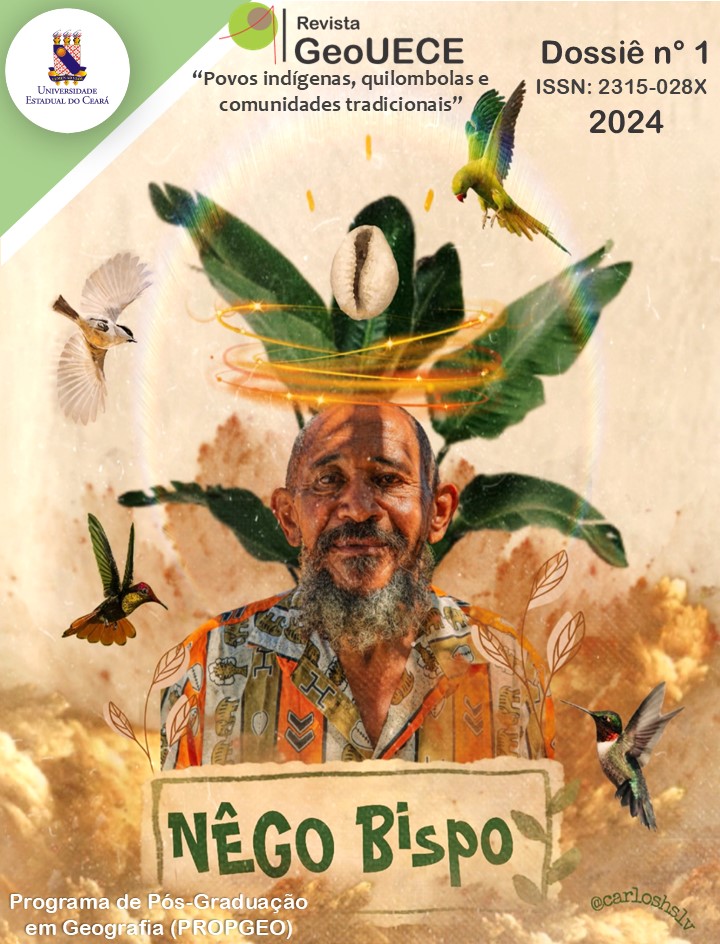INDIGENOUS KNOWLEDGE
reflections on teacher training and indigenous schools
DOI:
https://doi.org/10.52521/geouece.v13i25.12418Keywords:
Indigenous School Education; Training of teachers; Curriculum References for indigenous schools in Maranhão.Abstract
This article has the general objective of analyzing the contribution of the Curricular References for Indigenous School Education of Maranhão (RECEIMA) for the training of teachers from Maranhão. In addition to this, there are other objectives: a) to analyze the historical process of formulating RECEIMA for Indigenous School Education in Maranhão, b) to investigate the political-pedagogical principles that support the elaboration of RECEIMA and c) to characterize the conception of teacher training( es) present in RECEIMA. This is a qualitative research that was based on literature review and documentary analysis. The theoretical foundation was based on the works of Baniwa (2019), Grupioni (2006), Luciano (2006), Munduruku (2012), Papi (2005), Santos (2009), among others. The research showed that the construction of RECEIMA presented advances and achievements for Indigenous School Education in Maranhão, namely: professionalization of teachers in indigenous schools; encouraging the construction of political pedagogical projects for indigenous schools; insertion of the diversified part of the curriculum, adding Indigenous Law and Indigenous Language as differentiated curricular components; support for the development of specific teaching materials for indigenous schools, among others.
Downloads
Metrics
References
BANIWA, G. Educação escolar indígena no século XXI: encantos e desencantos. Rio de Janeiro: Laced, 2019.
BRASIL. Lei de Diretrizes e Bases da Educação Nacional – LDB Lei nº 9394/96. Disponível em: https://www2.senado.leg.br/bdsf/bitstream/handle/id/544283/lei_de_diretrizes_e_bases_2ed.pdf. Acesso em 04.12.2023.
______Referencial Curricular Nacional para as Escolas Indígenas. Ministério da Educação,1998. Disponível em: https://www.ufmg.br/copeve/Arquivos/2018/fiei_programa_ufmg2019.pdf. Acesso em 04.12.2023.
______.Resolução Nº 5. Sobre Diretrizes Curriculares Nacionais para a Educação Escolar Indígena na Educação Básica, 2012. Disponível em: https://normativasconselhos.mec.gov.br/normativa/view/CNE_RES_CNECEBN52012.pdf?query=ensino%20m%C3%A9dio
Acesso: 04.12.2023.
______.Resolução Nº 1. Sobre Diretrizes Curriculares Nacionais para a Formação de Professores Indígenas em cursos de Educação Superior e de Ensino Médio, 2015. Disponível: http://portal.mec.gov.br/index.php?option=com_docman&view=download&alias=16870-res-cne-cp-001-07012015&category_slug=janeiro-2015-pdf&Itemid=30192. Acesso em: 04.12.2023.
______.Constituição da República Federativa do Brasil de 1988. Brasília: 2016. Disponível em: https://www2.senado.leg.br/bdsf/bitstream/handle/id/518231/CF88_Livro_EC91_2016.pdf. Acesso em 28/11/2023.
GALEANO, E. As veias abertas da América Latina. Rio de Janeiro: Paz e Terra, 1972.
GRUPIONI, L. D. Formação de professores indígenas: repensando trajetórias. Ministério da Educação, Secretaria de Educação Continuada, Alfabetização e Diversidade. Brasília: 2006.
LUCIANO, G. J. dos S. Educação para manejo do mundo: entre a escola ideal e a escola real no Alto do Rio Negro. Laced, 2013.
______.O Índio Brasileiro: o que você precisa saber sobre os povos indígenas no Brasil de hoje. Ministério da Educação, Secretaria de Educação Continuada, Alfabetização e Diversidade. Brasília: LACED/Museu Nacional, 2006.
MARANHÃO. Secretaria de Estado da Educação. Referenciais Curriculares para a Educação Escolar Indígena do Estado do Maranhão (RECEIMA). São Luís: SEDUC/MA: 2021.
______. Documento Curricular do Território Maranhense para a Educação Infantil e Ensino Fundamental, 2019. Disponível em: http://basenacionalcomum.mec.gov.br/images/implementacao/curriculos_estados/documento_curricular_ma.pdf. Acesso em: 04.12.2023.
MARTINS, J. de S. Os camponeses e a política no Brasil: as lutas sociais no campo e seu lugar no processo político. Rio de Janeiro: Petrópolis, 1981.
MELIÀ, B. Educação Indígena na escola. Cadernos Cedes, ano XIX, nº 49, Dezembro/99. Disponível em: https://www.scielo.br/j/ccedes/a/LP3BV6QHbqSgTdPYXT9YZFG/abstract/?lang=pt. Acesso em 18.12.2023.
MUNDURUKU, D. O caráter educativo do movimento indígena brasileiro (1970-1990). (1970-1990). São Paulo: Paulinas, 2012.
______. Mundukurando. Edição do outar. São Paulo, 2010
PAPI, S. de O. G. Professores: formação e profissionalização. Araquara -SP: Junqueira & Marin, 2005.
PARAISO, M. A. Currículos: teorias e políticas. São Paulo: Contexto, 2023.
PIMENTA S.G. Formação de professores: saberes e identidade da docência. São Paulo: 2008. Disponível em: https://edisciplinas.usp.br/pluginfile.php/7957567/mod_resource/content/1/TEXTO%2010%20-%20PIMENTA%282%29%283%29.pdf. Acesso em 28/11/2023.
PRODANOV, C. C; FREITAS, E. C. de. Metodologia do Trabalho científico: métodos e técnicas da pesquisa e do trabalho acadêmico. Rio Grande do Sul: Novo Hamburgo, 2013.
RODRIGUES, S. J. D. Quem não tem é escravo de quem tem: migração camponesa e a reprodução do trabalho escravo contemporâneo. São Paulo: Paço Editorial, 2020.
_______. Território e questão agrária no Maranhão: megaprojetos de desenvolvimento e resistências camponesas no campo. São Luís: EDUFMA, 2020.
SANTOS, A. B dos. Somos da terra. Belo Horizonte: PISEAGRAMA, n.12, ago.2018. Disponível em: https://piseagrama.org/somos-da-terra/. Acesso em 17.12.2023.
TARDIF, M. LESSARD, C. O trabalho docente: elementos para uma teoria da docência como profissão de interação humanas. Petrópolis: Vozes, 2005.
VASSALO, B. O desafio poliamoroso: por uma nova política dos afetos. São Paulo: Elefante, 2022.
Downloads
Published
How to Cite
Issue
Section
License
Copyright (c) 2025 RAIMUNDA DE MORAES MOTA, MARILDA DA CONCEIÇÃO MARTINS , FRANCISCO JOSÉ FERREIRA CARVALHO, MARIA JOSÉ JANSEN SANTOS, JOCENILSON MENDES COSTA

This work is licensed under a Creative Commons Attribution-NonCommercial-NoDerivatives 4.0 International License.

































